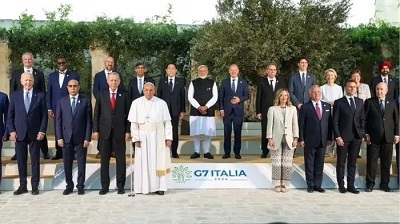Introduction
The recent Group of Seven (G-7) Outreach Summit in Italy’s Apulia region, held from June 13-15, saw the participation of leaders from the G-7 nations— the United States, Canada, Germany, France, Japan, the United Kingdom, and Italy—along with European Union leadership and invited leaders from various other nations, including India. The summit aimed to address a broad array of global issues, highlighting the G-7's attempt to bridge the gap between Western nations and the Global South. Prime Minister Narendra Modi's attendance marked his fifth participation in such an outreach, underlining India's growing importance on the global stage.
The G-7 Summit's Agenda
The 2023 G-7 summit had a comprehensive agenda. Central to the discussions were efforts to reconcile differences between Western countries and the rest of the world, devising new strategies to support Ukraine amid its ongoing conflict with Russia, and addressing challenges such as migration, climate change, and the implications of artificial intelligence. The G-7 leaders committed to making an additional $50 billion available for Ukraine, sourced from Russia's frozen sovereign wealth funds. They also held a special "Energy for Growth in Africa" summit aimed at boosting clean energy investments on the continent.
Another significant focus of the summit was China. The G-7 leaders criticized China for its coercive trade practices, reflecting broader concerns about China's growing economic influence. Additionally, the summit's agenda included meetings with leaders from ten countries and representatives from multilateral organizations to discuss the concerns of the Global South, signaling the G-7’s attempt to remain relevant and responsive to global issues beyond the Western bloc.
India’s Role in the G-7
India’s involvement in the G-7 outreach process has been significant. The country has been invited to the summit 11 times, reflecting its economic importance and its role as a leading voice in the Global South. India's steady growth during the global financial collapse in the 2000s initially drew the G-7's attention. As a member of the G-20 troika, along with Brazil and South Africa, India’s participation brings a crucial perspective to the table, particularly regarding the concerns of developing nations.
Prime Minister Modi has become a central figure at these outreaches, advocating for the interests of the Global South and emphasizing the importance of inclusive growth and sustainable development. His presence underscores India's strategic importance and its ability to influence global policy discussions, even though India is not a formal member of the G-7.
The G-7 as a Platform for India
The G-7 outreach sessions serve as a vital platform for India to showcase its achievements and global outlook. Prime Minister Modi's participation is indicative of the importance India places on these summits. The outreach session provides India with an opportunity to present its perspectives on crucial issues such as democracy, technology, artificial intelligence, and climate change.
During the recent summit, PM Modi highlighted the significance of India's democratic processes, the role of technology in bridging global inequalities, and the need for a collaborative approach to combat climate change. He emphasized the importance of addressing the concerns of the Global South, particularly regarding food, fertilizer, and energy security. Modi's bilateral meetings with leaders from the UK, France, Germany, Japan, Italy, and Ukraine, among others, further underscore the strategic importance of the G-7 platform for advancing India’s international relations.
Criticisms of the G-7
Despite its global influence, the G-7 faces substantial criticisms. One major critique is its perceived elitism and lack of inclusivity. The G-7 does not include three of the world’s top 10 economies—China, India, and Brazil—raising questions about its representativeness. Unlike the more inclusive G-20, the G-7 is seen as a relic of the Western elite, struggling to stay relevant in a rapidly changing global order.
The G-7's inability to effectively address major global crises also fuels criticism. Its failure to alter the course of Russia’s invasion of Ukraine, halt Israel’s bombardment of Gaza, or curb China’s expanding global influence calls into question its efficacy. These shortcomings highlight the limitations of the G-7 in enforcing its geopolitical agenda and maintaining its relevance as a premier global forum.
The Future of the G-7
The future of the G-7 is uncertain, with growing calls for reform and greater inclusivity. The group’s resistance to expanding its membership—having even reduced it by excluding Russia in 2014—contrasts sharply with the expansion of other international groupings like BRICS. The latter has grown to include new members like the UAE, Saudi Arabia, Iran, Egypt, and Ethiopia, enhancing its global influence and representativeness.
The G-7’s challenge lies in reinventing itself to remain an effective and relevant grouping. Upcoming elections in the UK and the US could bring new leaders to the forefront, potentially altering the group’s dynamics. The next G-7 summit, scheduled to be held in Canada’s Alberta region in 2025, will be crucial in determining whether the G-7 can adapt to the evolving global landscape and whether India will continue to engage with the group as an outsider.
Conclusion
India’s participation in the G-7 Outreach Summit highlights its significant role in global discussions, particularly as a key voice of the Global South. The summit’s extensive agenda, ranging from support for Ukraine to addressing global challenges like climate change and artificial intelligence, underscores the G-7’s attempt to remain relevant. However, criticisms of the G-7’s elitism and ineffectiveness pose serious questions about its future. For the G-7 to maintain its relevance, it must adapt to the changing global order, potentially by embracing greater inclusivity and addressing the criticisms leveled against it. India’s continued engagement with the G-7 will be pivotal in shaping the group’s future dynamics and ensuring that the concerns of the Global South are adequately represented.
|
Probable Questions for UPSC Mains Exam
|
Source – The Hindu







